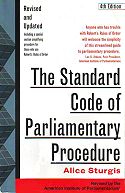
The Standard Code of Parliamentary Procedure
Encyclopedia

Alice Sturgis
Alice Sturgis was an author and parliamentarian, best known for writing the Sturgis Standard Code of Parliamentary Procedure. She was a practicing parliamentarian and consultant to national and international professional and business organizations...
) is a book of rules of order. It is the second most popular parliamentary authority
Parliamentary authority
A parliamentary authority is a manual on parliamentary law, containing rules of order for the transaction of business in deliberative assemblies...
in the United States after Robert's Rules of Order
Robert's Rules of Order
Robert's Rules of Order is the short title of a book containing rules of order intended to be adopted as a parliamentary authority for use by a deliberative assembly written by Brig. Gen...
. It was first published in 1950. Following the death of the original author in 1988, the third (1988) and fourth (2001) editions of this work were revised by a committee of the American Institute of Parliamentarians
American Institute of Parliamentarians
The American Institute of Parliamentarians is a not-for-profit educational organization founded in 1958 for the advancement of parliamentary procedure. From a first-year membership of only 48 members, AlP has grown into a progressive association with active chapters and regions...
. In October of 2011, a 5th edition, entitled New Standard Code of Parliamentary Procedure will be released.
The Standard Code (TSC) omits several of the motions and sometimes-confusing terminology used in Robert's Rules of Order
Robert's Rules of Order
Robert's Rules of Order is the short title of a book containing rules of order intended to be adopted as a parliamentary authority for use by a deliberative assembly written by Brig. Gen...
(RONR).
The cover quote of the 2001 edition states, "Anyone who has trouble with Robert's Rules of Order will welcome the simplicity of this streamlined guide to parliamentary procedure." The Standard Code devotes a chapter to the differences between the two works, along with suggestions for those familiar with the Standard Code when participating in organizations that use "Robert's Rules" as their parliamentary authority.
Robert's Rules of Order versus The Standard Code
| Robert's Rules of Order | The Standard Code | |
|---|---|---|
| Motions in RONR but not in TSC |
Call for the orders of the day Call for the orders of the day A call for the orders of the day, in parliamentary procedure, is a motion to require a deliberative assembly to conform to its agenda or order of business.-Explanation and Use:-Robert's Rules of Order Newly Revised :... |
Use informal request or point of order Point of order A point of order is a matter raised during consideration of a motion concerning the rules of parliamentary procedure.-Explanation and uses:A point of order may be raised if the rules appear to have been broken. This may interrupt a speaker during debate, or anything else if the breach of the rules... |
| Fix the time to which to adjourn | Instead amend Amend (motion) -Explanation and Use:-Main Motions:Any main motion and any motion to amend may be amended. However, a motion to amend a motion to amend may not be amended, due to the overly complex parliamentary situation that would frequently result.-Secondary Motions:... the privileged motion Privileged motion A privileged motion is a motion in parliamentary procedure that is granted precedence over ordinary business because it concerns matters of great importance or urgency... to adjourn |
|
| Objection to the consideration of a question Objection to the consideration of a question Objection to the consideration of a question is a method in parliamentary procedure of preventing a motion from coming before the assembly. It is often used to prevent an embarrassing question from being introduced and debated in the assembly.... |
Accomplished by different motions depending on circumstances. | |
| Postpone indefinitely Postpone indefinitely The motion to postpone indefinitely, in parliamentary procedure, is a subsidiary motion used to kill a main motion without taking a direct vote on it.-Explanation and Use:-Robert's Rules of Order Newly Revised :... |
Use form of table (requiring a two-thirds vote) | |
| Motions with different names |
Previous question Previous question Previous question, in parliamentary procedure is a motion to end debate, and the moving of amendments, on any debatable or amendable motion and bring that motion to an immediate vote.-Explanation and Use:It is often invoked by a member saying, "I call [for] the... |
Close debate and vote immediately (or other variations) |
| Concepts in RONR but not TSC | Committee of the Whole Committee of the Whole A Committee of the Whole is a device in which a legislative body or other deliberative assembly is considered one large committee. All members of the legislative body are members of such a committee... and quasi-committee of the whole |
Use informal consideration |
| Terminology differences | "Adjourned meeting" resumption of a meeting following an adjournment |
"Continued meeting" |
| Other differences | major differences in the treatment of the motions to reconsider Reconsider In parliamentary law, reconsideration of a motion takes places upon a motion to bring back for further consideration a matter previously decided... and table; |
|

